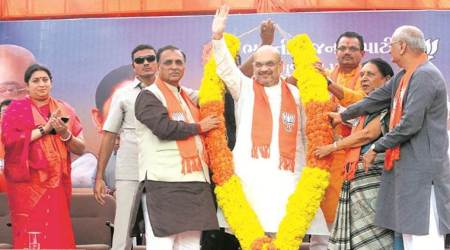 FILE- In this May 16, 2012 file photo, a man gets his retina scanned as he enrolls for Aadhar, India’s unique identification project in Kolkata, India. India’s top court has ruled that the right to privacy is a fundamental right of every citizen of the country (AP Photo/Bikas Das, File)
FILE- In this May 16, 2012 file photo, a man gets his retina scanned as he enrolls for Aadhar, India’s unique identification project in Kolkata, India. India’s top court has ruled that the right to privacy is a fundamental right of every citizen of the country (AP Photo/Bikas Das, File)
A nine-judge Constitution bench of the Supreme Court has unanimously ruled that privacy is a fundamental right, intrinsic under Article 21 and part III of the constitution. The landmark verdict came in response to a clutch of petitions that had challenged the Centre’s move to make Aadhaar mandatory for availing the benefits of various social welfare schemes. However, the judgment today is limited to the usage of right to privacy as another five-judge bench has been deliberating on the Aadhaar case since 2015.
The petitioners in the case hailed the verdict saying it would be looked upon by societies of law around the world with a lot of seriousness.
“This is a milestone in a large history across the world on understanding of the right to privacy. The largest democracy in the world has now spoken on the question which we all face because 20th century constitutions, let alone earlier constitutions did not tend to speak of right to privacy and they certainly didn’t speak of it in terms which allowed its application to the needs of human beings in the 21st century networked society. Indian SC has taken an enormous step which is going to be looked upon by societies of law around the world with enormous importance,” said Mishi Choudhary, president and legal director of Software Freedom Law Centre, a petitioner in the case.
The petitioners also spoke of how the landmark verdict would prevent intrusions into the personal lives of people.
“This unequivocally puts to rest any further attempts to create mechanisms for intrusion into the personal lives of people in India. Very importantly, it trashes the state position that the poverty stricken portion of the population is less than human, and unable to appreciate or deserve freedom and liberty, the position that has been repeatedly cited in defence of inefficient and incompetent governance,” said Vickram Crishna, board member at SFLC.
“We, the people of India, are once more able to stand with our heads high in the global community. We are grateful to the experts from the legal community who have tirelessly and freely striven to preserve the Constitution of India, itself the distillation of decades of sacrifice against the hegemony of discrimination,” he added.
The bench, that announced the verdict today, was led by Chief Justice JS Khehar and comprises of Justices J Chelameswar, S A Bobde, R K Agrawal, R F Nariman, A M Sapre, D Y Chandrachud, S K Kaul and S Abdul Nazeer.

